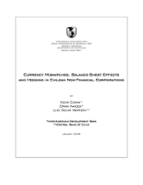Currency Mismatches, Balance-Sheet Effects and Hedging in Chilean Non-Financial Corporations
Date
Jan 2005
Using a new database on the currency composition of assets and liabilities, this paper explores the determinants and consequences of currency mismatches in Chilean non-financial firms. As in previous firm level studies for Chile, we find that in periods following a depreciation firms with higher dollar debt do not underperform their peso counterparts. However, once we adequately control for differences in the currency composition of assets, income and net derivative positions, we do find a significant balance sheet effect. In addition, we find that derivatives play a role in insulating firm level investment from exchange rate shocks. In line with previous studies, we also find evidence of currency matching in Chilean corporates. Firms in Chile actively reduce the risks associated with exchange rate exposure by matching the currency composition of their debt with that of their income and assets, and by taking on derivatives if no "real" hedge is available. Finally, we find significant changes in the level of net currency exposure after the exchange rate was floated in 1999. We argue that one possible interpretation of these results is due to the effect of higher exchange rate variance on the relative risk of domestic and foreign debt.



